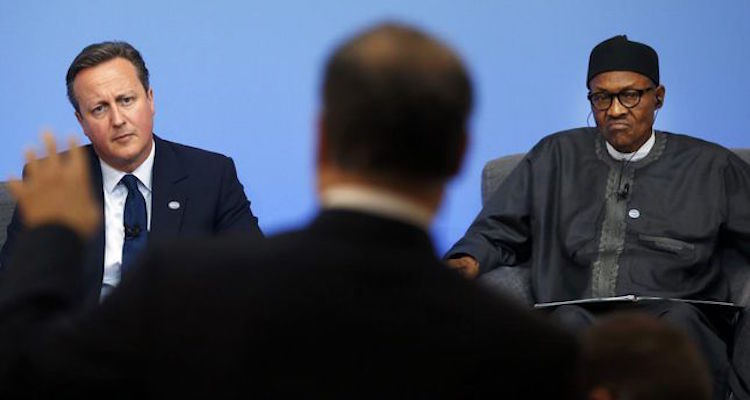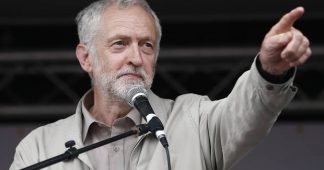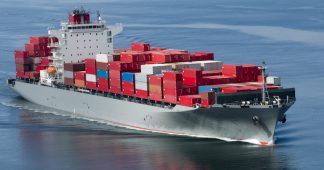There is a mad elephant tethered in the room of the Conservative Manifesto, wtites Felicity Dowling. That elephant is the dominance of service and finance industry in the UK, the sector that nearly broke the world economy in 2008. Linked to this dependence on finance and the service industry is the limited size of manufacturing industry. The dominance of finance can knock all talk of ‘stability’ for six.
The wealth of this country is not controlled by government but by the major finance institutions and a few huge corporations, yet all the talk in the Conservative manifesto is that the government can and will deliver change. All the government does in reality is sort monetary policy and legal boundaries.
The UK economy does not score highly though, in exports of goods. In 2016, the UK was the tenth-largest goods exporter in the world and the fifth-largest goods importer. In 2015, the UK had the fourth-largest inward foreign direct investment, and in 2013 the UK had the second-largest outward foreign direct investment.
The UK economy is one of the most globalised in the world. The UK was a pioneer of globalisation and the whole economy is based on it. More of its people live and work abroad than any other country, claims Boris Johnson, and it seems to be true. Yet this government is foully anti-migrant.
The Conservative Manifesto says, ‘London’s position as the global centre of finance make us more interconnected with the global economy than any other comparable nation’. By 2007, it was the largest city, by GDP, in Europe.
However, the control of the UK government over this sector is very limited – and this limited amount is at risk since Brexit. These companies are globally owned and move as they will. Once, the Conservatives were the spokespeople for big business, but even that is now dubious as big Finance did not want Brexit. But they are likely to follow the wishes of the big corporations as best they can within Brexit. Strong and stable? Hardly.
Free trade, frequently mentioned in the Manifesto, implies far less government regulation, not more. So what will the Conservatives do to make this country attractive for investment from abroad? Reduce regulation? This would preclude trade agreements with the EU, one of the UK’s greatest trading partners. Increase globalisation? Probably, but how will that help? Give subsidies to companies? It could not do this on any scale within its public finance parameters. Reducing wages and working conditions? Probably.
The government does not control investment or the global policy of the huge corporations. Even BP is only 40% British owned; it operates in 70 different countries. It is not controlled by Theresa May.
More than half of what remains of British industry has been sold to foreign companies. Much of Britain’s industry depends on foreign investment, not investment from UK companies.UK companies invest plenty abroad. There are still jobs in aerospace, and in pharmaceuticals, especially in research and development but these are globally, not locally, controlled
The Manifesto talks of an industrial strategy; what industry, what strategy? For decades the establishment has dismissed the importance of manufacturing industry, which represents now only 9% of GDP. Manufacturing and extractive industry was deliberately run down in this country.
‘In the past 30 years, the UK’s manufacturing sector has shrunk by two-thirds, the greatest de-industrialisation of any major nation. It was done in the name of economic modernisation – but what has replaced it?’ Aditya Chackrabortty wrote in The Guardian.
‘In significant part, it’s a tale about where Britain is going, one that’s been told by Conservative and Labour alike over the past 30 years. It’s a simple message that comes in three parts. One, the old days of heavy industry are gone for good. The future lies in working with our brains, not our hands. Two, the job of government in economic policy is simply to get out of the way.
‘Oh, and finally, we need to fling open our markets to trade with other countries because, despite the evidence of countless Wimbledons and World Cups, the Westminster elite believe that the British can always take on the competition and win.
‘Again, the theme was simple: most of what could be manufactured could be done so more cheaply elsewhere. The future lay in coming up with the ideas, the software, and most of all, the brands. Once the British had sold cars and ships to the rest of the world; now they could flog culture and tourism and Lara Croft.’
Steel struggles to stay alive in the UK, a basic core industry for any economy with aspirations to a manufacturing base. Such steel industry as we still have, is not UK-owned, investment in it comes from abroad.
The arms industry is a growing one. Should we be proud though, that the foul bombs dropped by the Syrian government on its beleaguered people are made in Artherton, in Greater Manchester, just outside Wigan?
The new technology industries around wind and solar were hindered by this government, whilst Germany and China have raced away with such developments.
The Manifesto says, ‘A new Conservative government will stick to the plan that has delivered stability and certainty’. Stability and certainty has not been seen under this or the previous coalition government. Certainty perhaps has, that we are getting poorer, sicker and worse-housed, whilst the rich are getting richer.
We will ‘invest in infrastructure and people’, says the Manifesto – invest with what money? There is no record of infrastructure investment by the Conservatives. The roads of this country are pitted with pot holes and the motorways grind into gridlock. Try driving the M6 on a Friday. The railways are heavily subsidised, but beyond the means of many people to use, even for longer journeys. Commuting journeys are uncomfortable and dangerous, and do not compare to other modern economies. It would be great if they did invest, but this will mean greater government spending which they decry as dangerous. They want ‘sound public finances’; so from whence comes the infrastructure investment? It’s not surprising they have not publicly costed their Manifesto.
The Manifesto claims that, ‘Sound money and responsible public finances are the essential foundations of national economic success’.
But what do they mean by sound money? The utterly wasteful and ineffective quantitative easing that has given so much the very rich, the top 5% and above, giving them more money to squirrel away whilst failing to invest? £96,000 for every one of the 1.25 million of Britain’s wealthiest, just up to 2012 and more since then, according to Faisal Islam on Channel 4, quoting bank of England figures.
Meanwhile our communities suffer the bedroom tax, benefit caps, mobility cars confiscated, homelessness and public sector pay restraint.
Yet this is the government of quantitative easing, of neglect of core infrastructure, of the fall in wages and the appalling working conditions seen in recent years. That is why poverty and food banks and dereliction is growing. We have seen the most appalling cuts since the 1930s with many people, some even in work, not having enough money for food and basics. How many more cuts can people take?
The Manifesto says, ‘The independent Office for Budget Responsibility forecasts that the national debt is finally about to start falling’. It’s not quite a lie but is not exactly truthful either. The Office for Budget Responsibility says it expects debt as a percentage of national income to peak in the current financial year at 88%, the highest level since 1966.
Returning to the question of industrial strategy, the Manifesto speaks of ‘Our modern industrial strategy’ without saying how investment will be generated, without saying which industries, without any outline of how a qualitative change in the British economy is to be developed. Further it says that this strategy ‘is designed to deliver a stronger economy that works for everyone –where wealth and opportunity are spread across every community in the United Kingdom, not just the most prosperous places in London and the south east’.
How? What will they do? The Conservatives claim that they can ‘ensure that the whole of our economy across the whole of our country can grow’.
Manufacturing industry is less than 10% of the economy at the moment, yet the Conservatives ask us to believe their wish list will change the fundamentals of the globalised economy which concentrates wealth in huge global cities? How will this revolutionary change happen? How will it happen in a low tax, free trade economy where investment rates are very low?
The Bank for International Settlements (BIS), the central bankers’ association (dominated by Austrian economics), believes that ‘the uncertainty about the economic outlook and expected profits play a key role in driving investment, while the effect of financing conditions is apparently small.’
As there is no mention of how they will make this work, this is mere window dressing and pious aspiration.
One of the Manifesto’s most ridiculous statements is this: ‘We have done much in recent years to break down longstanding divisions in our country’. In reality, the UK is one of the most unequal countries. Our children are amongst the least happy, and one in 4 live in poverty. What world do the Tories live in? The world of Sunderland is a long way from Surrey, the bedroom tax far from the oligarchs in London; benefit caps for the poor of London are far from the vast sums given to the top 5% through quantitative easing.
Conservative economics, as published in their Manifesto, are bogus, and are intent on obscuring the huge problems this economy faces. The real issues show how weak and wobbly they are.
A real industrial strategy could make a difference. It would be based on
- a million climate jobs
- on a Lucas-style revival of industry
- on building a million sustainable council homes
- on ending austerity and letting our cities spend enough to maintain services
- on pay rises sufficient to let people spend
- on investing in research in our universities and colleges
- and on building international links at working class level.
We need a fundamentally different and better world. We cannot afford the Conservatives.











